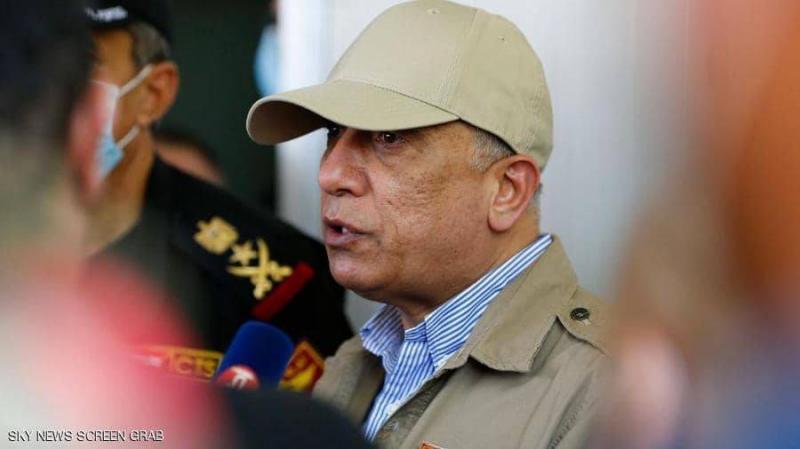Under the title "The Assassination Attempt on al-Kadhimi... Could It Be the Beginning of the End for the Militias?", Sky News published a special report about the implications of the failed assassination attempt on Iraqi Prime Minister Mustafa al-Kadhimi. The report noted that political interpretations in Iraq and abroad nearly agree that the assassination attempt on Prime Minister Mustafa al-Kadhimi will not go unaddressed and will mark a turning point in how Baghdad deals with the growing threat posed by the militias associated with the Popular Mobilization Forces (PMF).
It added that the armed militias, after the devastating defeat of the political parties they represent in the recent parliamentary elections and following the assassination attempt on al-Kadhimi, seem determined to change the rules of the game and to intensify their dominance over the country, its authorities, and its laws, as this time the target was the head of the executive authority.
Political researchers speculated that the reason behind the armed militias in Iraq resorting to this dangerous escalation is the fear they and their backers have of losing their status and influence, as well as the potential loss of their sources of power. This concern has been heightened by the ongoing discussions about banning these militias and disarming them, which has gained significant momentum both publicly and officially in Iraq, especially after the failed assassination attempt on the Iraqi Prime Minister, which provoked widespread Arab and international reactions in solidarity with Iraq against the militias.
Strong Indicators
The director of the Political Thinking Center, Ihsan al-Shammari, stated in an interview with "Sky News Arabia": "There are strong indicators, of course, of the beginning of the end for these armed factions within the PMF, among the most important of which are the results of the recent elections and the absence of a popular Iraqi desire for their presence and the continuation of their uncontrolled weapons outside the framework of the state from now on."
The Iraqi university professor continued: "Even before the assassination attempt, the recent bloody clashes that occurred at the gates of the Green Zone in the capital, Baghdad, between these armed factions and the regular forces responsible for protecting that area, reinforce the impending end of their influence through their political faces."
He added: "Therefore, the threats made against Prime Minister al-Kadhimi by leaders affiliated with these factions, and the statements some made about resorting to military options to reject the results of the early general elections, all constitute signs of reaching a breaking point regarding the future of these groups facing collapse."
According to al-Shammari, there are indicators of the Iraqi street's rejection of these militias. He stated: "Their attempts to assert control over the Iraqi state, and their targeting of the head of the Iraqi executive authority, constitute a fatal blow to them that will cost them much in terms of influence and impact. Consequently, their political role is in the process of dismantling and shrinking to the point of disappearing, but nonetheless, the issue of uncontrolled weapons outside the framework of the state remains unresolved and requires bold decisions and political will to regulate and disarm it."
Mandatory Military Service Law
Meanwhile, Raed Al-Ezawi, the director of the Al-Amsar Center for Strategic Studies, sees in an interview with "Sky News Arabia" that "the motivations behind the assassination attempt on al-Kadhimi and the entities executing it are well-known, but since the PMF is part of the Iraqi security and military system, its dissolution requires several measures, the most important of which is the enactment of the Mandatory Military Service Law proposed by al-Kadhimi's government, which unfortunately did not get passed in the Iraqi Parliament as it was at the end of its legislative term prior to the last elections."
Al-Ezawi considered that "this law is very important as it will unite Iraqis under the Iraqi military service, and there will be no armed groups like the PMF outside of this comprehensive national framework."
He added: "A large segment of Iraqi youth are unemployed and are forced to join the PMF factions to benefit from salary perks and other privileges, and here mandatory military service is the optimal solution."
Al-Ezawi continued: "With this cowardly assassination attempt against Mr. al-Kadhimi, it has become necessary to put an end to the armed militias affiliated with Iran in Iraq, and what is required is to abolish the law that specifically established the PMF and enact the Mandatory Military Service Law that includes all Iraqis, whether through volunteering or mandatory service."
The Iraqi academic warned that: "The continued existence of the PMF in this manner has become a heavy burden on Iraq and on the current and upcoming Iraqi government. After this heinous assassination attempt, the international community will likely move toward imposing international sanctions, especially from the U.S. and Europe, on these involved armed militias, thereby leading Iraq into a serious predicament similar to what is happening in Iran...".




